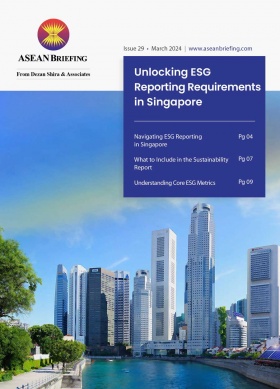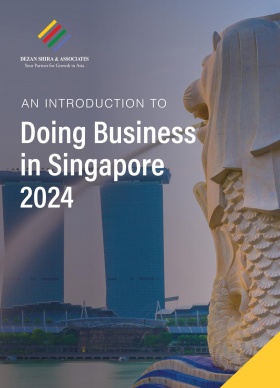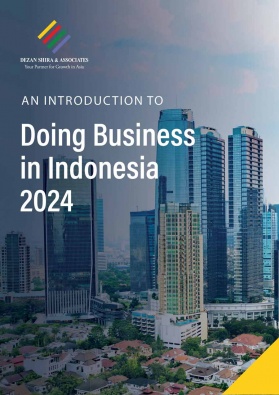The Allure of Singapore for High-Tech Manufacturing
Singapore has emerged as a global hub for high-tech manufacturing, attracting leading multinational corporations with its strategic location, robust infrastructure, and business-friendly environment. The city-state offers a highly skilled workforce, advanced research facilities, and strong intellectual property protection, making it an ideal destination for industries such as electronics, biomedical sciences, and precision engineering.
Further, Singapore provides unparalleled access to the Southeast Asian market which comprises of more than 600 million people and is predicted to be the world’s fourth-largest economy by 2030 with a combined GDP of US$3.7 trillion.
What makes Singapore so alluring for manufacturers?
Ease of setting up a business
Singapore is renowned for its streamlined and efficient business setup process, consistently ranking among the top countries in the world for ease of doing business.
As such, a primary advantage of Singapore is its ability to act as a centerpiece for the holding and management of regional assets. Holding companies are a vital component of any international expansion strategy, and Singapore offers investors a stable environment from which to administer operations in more speculative markets in Asia. The city-state has already attracted more than 37,000 international companies and 7,000 multinational companies that utilize Singapore as their regional headquarters.
With an efficient online registration system, over 99 percent of companies are incorporated within a single day. The city-state’s corporate tax rate stands at a competitive 17 percent, further enhanced by various tax incentives for startups and high-tech industries.Further, the minimum paid-up capital to establish a company is only S$1 (US$0.75).
Benefitting from Singapore’s tax policies and free trade network
Singapore’s tax system is internationally recognized as efficient and competitive, which allows foreign investors to enjoy low tax rates and numerous tax incentives. The country operates a single-tier, territorial tax system, which means that foreign-sourced income would not face additional taxes in Singapore. There is also no capital gains tax and there is no tax on dividends. Businesses can benefit from Singapore’s vast network of DTAs and unilateral tax credits, which further allows Singapore companies to reduce or eliminate taxes on their foreign-sourced income.
For individuals, Singapore can attract quality talent from around the world by offering low personal income taxes and individuals can also reduce their effective tax rates through incentives offered by the government. Meanwhile, Singapore’s extensive FTA, coupled with a transparent legal system and educated workforce, has accelerated the country’s transformation to a first-world economy.
Singapore’s extensive free trade agreements (FTAs) and transparent administrative system have played a crucial role in transforming into a first-world economy. The country has 15 bilateral and 12 regional FTAs, including significant agreements within the ASEAN-China, ASEAN-India, and ASEAN-Hong Kong trade blocs. These agreements offer Singapore-based businesses access to preferential markets, reduce or eliminate import tariffs, and strengthen intellectual property protections. While other regional players maintain strong FTA networks, none are as comprehensive as Singapore’s. As a result, Singapore remains the prime location for businesses aiming to expand into Southeast Asia and neighboring regions.
Incentives for businesses
Companies setting up in Singapore are eligible for various fiscal and non-fiscal incentives if their business is deemed beneficial to the country’s economic development. Applicants must fulfil rigorous requirements, which include committing to certain levels of investments, introducing leading-edge skills, technology, and contributing to the growth of research and development and innovation capabilities. However, most of these incentives have local ownership requirements.
- Singapore Economic Development Board (EDB) – which is responsible for developing and executing strategies that facilitate investment into the country’s industries;
- Inland Revenue Authority of Singapore (IRAS) – the tax regulatory authority in the country;
- Enterprise Singapore (ESG) – which aids Singaporean companies expand worldwide and promotes local exports; and
- Monetary Authority of Singapore (MAS) – the central bank and financial services authority.
Progressive Wage Credit Scheme
The Progressive Wage Credit Scheme (PWCS) was introduced into the 2022 budget to help employers adjust to mandatory increases for lower-wage workers. The scheme enables the government to co-fund the wage increases of Singaporean employees earning a gross monthly wage of up to S$3,000 (US$2,213). Singaporean residents and permanent resident employees are eligible for the scheme. Under the scheme, employees can receive support for gross monthly wage increases up to S$2,500 (US$1,844) up to 2026, as well as support for gross monthly wage increases above S$2,500 (US$1,844) and up to S$3,000 (US$2,213) up to 2024. Eligible wage increases will be cofounded for two years. Eligible employers do not need to apply and will be informed by the Inland Revenue Authority of Singapore (IRAS) of any payouts.
|
Co-funding Levels for Wage Increases in Singapore |
||
|
Qualifying year |
First-tier |
Second-tier |
|
|
Gross monthly wage less than S$2,500 (US$1,844) |
Gross monthly wage of more than S$2,500 (US$1,844) and up to S$3,000 (US$2,213) |
|
2022 |
75% |
45% |
|
2023 |
75% |
45% |
|
2024 |
30% |
15% |
|
2025 |
30% |
– |
|
2026 |
15% |
– |
Enterprise Financing Scheme-Trade Loan
The enterprise financing scheme–trade loan (EFS-TL) was put in place from April 1, 2023 to March 31, 2025. The EFS-TL provides enterprises with trade financing of up to S$10 million (US$7.3 million) per borrower. The government’s risk share on the loan is 70 percent and the maximum repayment period is one year.
The enterprise financing scheme project loans (EFS-PL) were in place until March 31, 2025. The program provides financing for certain overseas projects. The supportable loan types include:
- Land/building/factory (including purchases/renovation/construction);
- Working capital loans; and
- Machinery, equipment, other fixed assets.
There is up to S$50 million (US$36.9 million) available per borrower, for overseas projects, and S$30 million (US$22.2) per borrower, for domestic projects. Further, there is also up to S$50 million (US$36.9 million) available per borrower group, for overseas projects, and S$30 million (US$22.2) for domestic projects.
The government’s risk share is 50 percent, and 70 percent for young companies — defined as companies incorporated within the past five years and is more than 50 percent equity owned by individuals. The maximum repayment period is up to 15 years for fixed asset loans and up to five years for working capital loans and guarantees.
SME fixed assets loan
This scheme assists in financing the investment of domestic and overseas assets, such as for the purchasing of equipment and machines as well as factories. The maximum loan available is S$30 million (US$22.2) with a repayment period of 15 years. The risk share is set at 50 percent with young companies eligible for a risk share of 70 percent.
Venture debt loan
The venture debt loan scheme is used for high-growth start-ups that do not have significant assets that can be used as collateral for bank loans. Start-ups can utilize the funds to grow their business or diversify their products or services. The maximum loan available is S$8 million (US$5.9 million) from April 1, 2021, and the repayment period is five years. The risk share is set at 50 percent with young companies eligible for a risk share of 70 percent.
Merger and acquisition loan
The merger and acquisition (M&A) loan scheme aims to assist businesses in acquiring local or international companies. The maximum loan available for this scheme is S$50 million (US$36.8 million), and the repayment period is five years.
Enterprise Development Grant
The Enterprise Development Grant (EDG) helps Singapore businesses grow and innovate. The grant helps fund 50 percent of the project costs from April 1, 2023, until March 31, 2026. The grant supports projects under three pillars:
- Core capabilities — projects under core capabilities help businesses strengthen their foundations, going beyond the basic functions of sales and accounting.
- Innovation and productivity — under innovation and productivity, EDG supports companies looking to enhance efficiency and explore new areas of growth.
- Market access — this helps Singaporean companies to venture overseas. The EDG may help defray some of the costs for this expansion.
Implementing industry 4.0 in Singapore’s manufacturing sector
Industry 4.0 will impact operational processes and technologies used in Singapore’s manufacturing sector. This includes everything from automation and the application of the Internet of Things (IoT) to robotics and 3D printing. Manufacturers that can embrace Industry 4.0 stand to benefit from higher efficiency, cost savings, and a boost to bottom-line growth. We explore key sub-sectors within Singapore’s manufacturing sector that can implement or have already implemented Industry 4.0 practices.
Industry 4.0 opportunities in key manufacturing sub-sectors
Electronics and semiconductor manufacturing
Electronics manufacturing is the bedrock of Singapore’s manufacturing sector, contributing to approximately eight percent of the GDP and 20 percent of total manufacturing jobs. From its modest beginning as the only TV assembly plant in Southeast Asia, Singapore has become a vital manufacturing hub for higher value-added electronic components.
The global electronics industry is projected to grow to US$3.3 trillion in 2030 from US$2.2 trillion in 2020. This growth will be driven by artificial intelligence (AI), 5G, automation, and the electrification of automobiles, among others. These applications will increase demand for microchips and in turn, semiconductors – an industry with the potential to become a high-growth area for Singapore.
The country’s semiconductor industry is, in fact, one of the most diverse in the region, attracting global players like United Microelectronics Corporation and Siltronic AG, and contributing to seven percent of GDP. This makes the sub-sector a fundamental contributor to Singapore’s electronics manufacturing output. Further, the city-state accounts for approximately 11 percent of the global semiconductor market share and manufactures one-fifth of the global semiconductor equipment.
Medical devices
The use of Industry 4.0 technology in the healthcare industry can deliver better care to patients. For example, AI can screen enormous amounts of data to recognize specific medical conditions that human diagnosis could easily miss. Moreover, AI tools can assist in running hospitals more efficiently, such as by identifying how staff and equipment can be better utilized.
More than 60 multinational medical technology (medtech) companies are leveraging the country’s strong engineering capabilities and high-quality assurance to manufacture high-value products, ranging from life science instruments to contact lenses.
In addition, some 60 percent of the world’s microarrays and one-third of the world’s mass spectrometers are manufactured in Singapore. Investors are attracted by Singapore’s strong base for research and innovation that helps medtech firms in designing new business models in healthcare, such as the use of big data to provide better patient-centric care. This, in turn, provides medtech companies with the capabilities to export their products or services to go-to-markets in the Asia Pacific.
About Us
ASEAN Briefing is produced by Dezan Shira & Associates. The firm assists foreign investors throughout Asia and maintains offices throughout ASEAN, including in Singapore, Hanoi, Ho Chi Minh City, and Da Nang in Vietnam, in addition to Jakarta, in Indonesia. We also have partner firms in Malaysia, the Philippines, and Thailand as well as our practices in China and India. Please contact us at asean@dezshira.com or visit our website at www.dezshira.com.
- Previous Article Vietnam Extends VAT Cut Until 2024
- Next Article Unlocking Prosperity: Key Reasons to Invest in Timor-Leste








